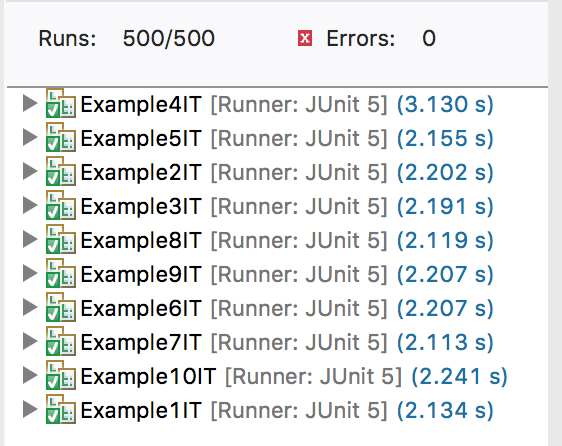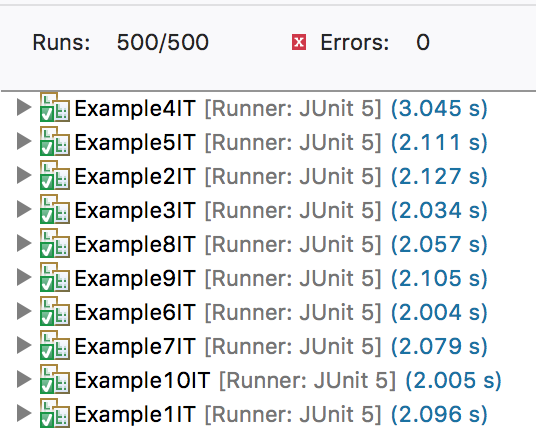-
Notifications
You must be signed in to change notification settings - Fork 38.7k
Description
Affects: Spring 5.2.4
We have a relatively large, monolithic Spring Boot application and I have been doing some profiling of our integration tests. For context, our application has 1127 bean definitions and a majority of our performance issues are in our code base.
However, I did find a hotspot in the TransactionalTestExecutionListener. It has two methods to find annotated methods on the test class: runBeforeTransactionMethods() and runAfterTransactionMethods.
I am using JProfiler with full instrumentation, so the times are skewed :
After looking at the code for a bit, I extended the listener to cache the list of methods for a given class and replaced the the default listener with our custom listener:
public class CachingTransactionalTestExecutionListener extends TransactionalTestExecutionListener {
/**
* A cache of class -> methods annotated with BeforeTransaction.
*/
private static LruClassMethodCache beforeTransactionMethodCache = new LruClassMethodCache(4);
/**
* A cache of class -> methods annotated with AfterTransaction.
*/
private static LruClassMethodCache afterTransactionMethodCache = new LruClassMethodCache(4);
@Override
protected void runBeforeTransactionMethods(TestContext testContext) throws Exception {
try {
List<Method> methods = beforeTransactionMethodCache.get(testContext.getTestClass());
if (methods == null) {
methods = getAnnotatedMethods(testContext.getTestClass(), BeforeTransaction.class);
Collections.reverse(methods);
for (Method method : methods) {
ReflectionUtils.makeAccessible(method);
}
beforeTransactionMethodCache.put(testContext.getTestClass(), methods);
}
for (Method method : methods) {
if (logger.isDebugEnabled()) {
logger.debug("Executing @BeforeTransaction method [" + method + "] for test context " + testContext);
}
method.invoke(testContext.getTestInstance());
}
}
catch (InvocationTargetException ex) {
if (logger.isErrorEnabled()) {
logger.error("Exception encountered while executing @BeforeTransaction methods for test context " +
testContext + ".", ex.getTargetException());
}
ReflectionUtils.rethrowException(ex.getTargetException());
}
}
protected void runAfterTransactionMethods(TestContext testContext) throws Exception {
Throwable afterTransactionException = null;
List<Method> methods = afterTransactionMethodCache.get(testContext.getTestClass());
if (methods == null) {
methods = getAnnotatedMethods(testContext.getTestClass(), AfterTransaction.class);
for (Method method : methods) {
if (logger.isDebugEnabled()) {
logger.debug("Executing @AfterTransaction method [" + method + "] for test context " + testContext);
}
ReflectionUtils.makeAccessible(method);
}
afterTransactionMethodCache.put(testContext.getTestClass(), methods);
}
for (Method method : methods) {
try {
if (logger.isDebugEnabled()) {
logger.debug("Executing @AfterTransaction method [" + method + "] for test context " + testContext);
}
method.invoke(testContext.getTestInstance());
}
catch (InvocationTargetException ex) {
Throwable targetException = ex.getTargetException();
if (afterTransactionException == null) {
afterTransactionException = targetException;
}
logger.error("Exception encountered while executing @AfterTransaction method [" + method +
"] for test context " + testContext, targetException);
}
catch (Exception ex) {
if (afterTransactionException == null) {
afterTransactionException = ex;
}
logger.error("Exception encountered while executing @AfterTransaction method [" + method +
"] for test context " + testContext, ex);
}
}
if (afterTransactionException != null) {
ReflectionUtils.rethrowException(afterTransactionException);
}
}
// ...
private static class LruClassMethodCache extends LinkedHashMap<Class<?>, List<Method>> {
/**
* Create a new {@code LruCache} with the supplied initial capacity
* and load factor.
* @param initialCapacity the initial capacity
* @param loadFactor the load factor
*/
LruClassMethodCache(int initialCapacity) {
super(initialCapacity);
}
@Override
protected boolean removeEldestEntry(Map.Entry<Class<?>, List<Method>> eldest) {
if (size() > 4) {
return true;
} else {
return false;
}
}
}
static class PostProcessor implements DefaultTestExecutionListenersPostProcessor {
@Override
public Set<Class<? extends TestExecutionListener>> postProcessDefaultTestExecutionListeners(
Set<Class<? extends TestExecutionListener>> listeners) {
Set<Class<? extends TestExecutionListener>> updated = new LinkedHashSet<>(listeners.size());
for (Class<? extends TestExecutionListener> listener : listeners) { updated.add(listener.equals(TransactionalTestExecutionListener.class)
? CachingTransactionalTestExecutionListener.class : listener);
}
return updated;
}
To test this, I created 10 IT classes (each with 50 methods), and just do a simple assert. :
public class Example1IT extends BaseDaoTest {
@Test
public void test1() {
assertThat("This String").isNotNull();
}
@Test
public void test2() {
assertThat("This String").isNotNull();
}
// ...
@Test
public void test50() {
assertThat("This String").isNotNull();
}There is some "noise" because I am running this on my machine but the results look promising (but definitely not scientific 8)
After this change, the hotspot is no longer present in our profiling results and when running those 500 tests with no profiler in play:
Before:
After:
I wish I could report back how this change impacts our 8000+ integration test but I am currently working from home and the database activity over the VPN makes it very difficult to get repeatable results.


